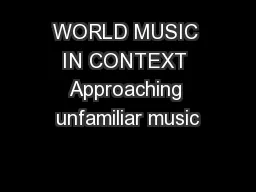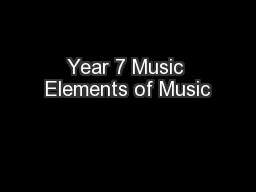PPT-Rationalism and Its Impact on Music
Author : alida-meadow | Published Date : 2016-06-21
Baroque Used to identify period in art and music history before 1600 to about 1750 Originally a pejorative word overornamented distorted grotesque used by critics
Presentation Embed Code
Download Presentation
Download Presentation The PPT/PDF document "Rationalism and Its Impact on Music" is the property of its rightful owner. Permission is granted to download and print the materials on this website for personal, non-commercial use only, and to display it on your personal computer provided you do not modify the materials and that you retain all copyright notices contained in the materials. By downloading content from our website, you accept the terms of this agreement.
Rationalism and Its Impact on Music: Transcript
Download Rules Of Document
"Rationalism and Its Impact on Music"The content belongs to its owner. You may download and print it for personal use, without modification, and keep all copyright notices. By downloading, you agree to these terms.
Related Documents














